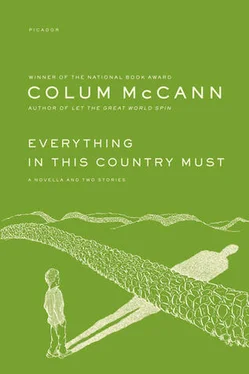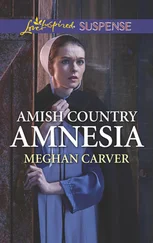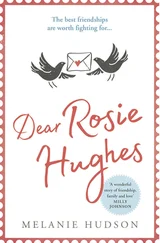He didn’t stir from the table. She finished her prayers and climbed into her bed in the vast and attentive silence. He whispered the line again, Fuck the Queen, loud enough that she might hear, but she had turned her face away. He could hear the sobs into the hood of the sleeping bag, and he said aloud that he was sorry, but she didn’t turn.
A half hour later he said it again — Sorry, Mammy — but she had fallen asleep.
He reached out and began to mold another piece of bread and the hours slid forward and by morning he had made two chess teams — one white, the other the brown of cocoa — just two pieces missing.
* * *
AFTER THREE DAYS he was allowed out again and he ran down to the house, but there was no sign of them in the front, so he stole around to the side window. The old man was napping. His wife sat at a mirror. The boy could see her reflection. There were brown freckles in the glass and she kept shifting her head sideways in order to avoid them. Between her neck cords there was a deep hollow. Her skin seemed corrugated and her eyes were a startling green. She took off her housecoat and the boy ducked his head, and when he looked a second time, she already had her nightdress on. She climbed into the bed and leaned across the old man, reached for a book, and momentarily both their bodies merged into one.
The boy moved away from the house and spat on the ground where the sunlight hit shadow.
* * *
THE WIND CAME UP from the sea as if it were looking for someone. It was the fifty-first day and he had heard that another hunger striker was critically ill and his uncle in the prison hospital was having a hard time focusing his vision, that everything was blurry. A prison guard had come and taunted him with binoculars. There were jokes being made about very thin coffins. His uncle was lying on a sheepskin blanket now to protect his skin, and he had been moved to a waterbed to keep away the sores. The boy imagined what his body might look like: the chest caved in, his arms thin, his hipbones showing through his pajamas. He was unable to walk now, and there were prison orderlies who wheeled him around. Sometimes the orderlies, even though they were Protestants, would bring him tobacco, which was only worsening his cough. He was allowed to sit outside in the prison hospital courtyard for an hour each day, and despite the warm weather his uncle wrapped himself in half a dozen blankets. He liked to make bets with others in the hospital on when certain crows would leave the razor wire of the prison. He had sent out a statement saying he wasn’t afraid of death because it was a cause worth his life.
The boy began to think that death was a thing that only the living carried with them. He remembered a poem from school. Death once dead there’s no more dying then. The line shot around in his mouth as he slumped through town.
Kayaking kept the thoughts away. The world was altered from the position of water. In the repetition there was quietness. He could feel his arms strengthening and a small knot of muscle growing harder at his neck. His back felt tight and powerful. Even his knees no longer protested at the ache. He checked the size of his biceps against the black armband that he wore.
The old Lithuanian allowed him a stint at the rear of the kayak, where most of the movement was controlled, and he made deliberate mistakes so the boy would correct them. The boat went sideways right and he pulled harder left. The old man leaned over so the boy would learn how to use the paddle to steady the boat. Out beyond the harbor, they went sideways into a series of low waves from a passing speedboat and for a moment they surfed along a rush of water until hit by another wave and the boat felt as if it would overturn, but the boy turned the boat bow first into the waves and the Lithuanian nodded his approval.
The boy sensed he had achieved a rhythm with the old man, that there was some invisible axle that joined them, making their arms rotate at the same time; they were part of the same machinery, and together they were distancing themselves from all other machines. He thought of cogs clicking into the handiwork of the sea, meeting at the right moment, noiselessly. They worked in unison and their paddles didn’t clash in the air and it struck the boy that the air between them was charged with mystery.
Far out, they turned, found shelter in a cove where seals barked on the rocks, and stopped paddling and let the boat drift. The water lapped gently against the side of the boat and the seals barked farther down the shore.
The old man smoked and when the cigarette was finished the boy secretly picked the butt out of the water and put it in his pocket to dry out. He let his paddle float and put his arms behind his head and wondered aloud about what sort of power it might take to club a seal to death.
There’s not much worth dying for, said the old man.
What?
Especially if you’re a seal, he chuckled.
But the boy thought he was talking of something beyond seals, and all of a sudden he felt an anger and he said bitterly: Why did you come here?
Oh, I really don’t think about these things anymore.
Why not?
Because it’s easier not to.
I’d love to club a seal to death, said the boy.
The sun shone down a hard yellow and wheels of light worked on the water’s edge. The boy’s paddle struck the water and moved the boat forward slightly. The old man accepted the anger and leaned into the toil of paddling out of the cove. The wind was at their backs and the boat moved quickly. They brought it parallel to the headland and then swung with ease into the harbor, both the boy and the man silent.
When they got to the pier the boy spat in the water and then put his finger to his nose and let out a stream of snot. The old man gave a small chuckle.
At the pierside the old woman asked them if they were all right. They each nodded and she laughed, distilling the tension. She had brought them lettuce and tomato sandwiches and she brandished them in the air, a grin on her face.
When they sat at the edge of the pier she put her arm around the boy’s shoulder and said she was glad that her husband had a partner to take to the water with.
He’s got a new happiness, said the woman.
The boy looked at her from under a stray lock of hair.
We never had any children, she said.
The old man coughed and gave her a hard look but she just smiled back.
You look tanned, she said to the boy, and he touched his face as if it didn’t belong to him.
He was taken to the house and was surprised by their poverty. She wore a pale housedress and her slippers were made from worn carpet. A ratty sofa had stuffing peeping out. The tasseled runner on a piano was frayed. An empty birdcage hung from the ceiling and the slatted light from the torn window blinds showed the walls in need of paint.
The woman heated a bowl of strange-tasting soup, and when she handed him the cup, he noticed a milky foulness to her breath. She gave him a round piece of bread with a hole in the middle, like a doughnut. She called it a baronka and she said that in some places it was called a bagel. She had baked it herself and it was fresh in his mouth and he wondered what sort of chess set he could make from it. He stretched his toes out to the electric bar heater which stood in front of the fireplace. It gave out an uneven heat. Two fire irons and a poker were arranged in front of the fireplace and he wondered why they didn’t light a real fire, and when he asked, the old man said there was a family of swifts that lived in the chimney and he didn’t want to burn them out. He explained that, when he and his wife first moved in, it had seemed to him that the flue was singing.
When the soup was finished the woman asked him if he had enjoyed the meal. The bread was nice but it was the worst soup the boy had ever tasted in his life, yet still he told her it was lovely and she smiled at him and retreated to an old oak swivel chair. She twirled in it and hummed a little tune to herself. He noticed that her housedress was thin at the elbows, but she wore a couple of thick fancy bracelets on her wrist.
Читать дальше












